Haitian vigilantes battle Barbecue’s gangs in Port-au-Prince as country’s elites vie for power – with island left in darkness after power stations are ambushed and dead bodies litter the streets
The turf war tearing Haiti apart is being fought in the dark after joint attacks on power plants plunged much of the capital Port-au-Prince into darkness.
Hundreds of dead bodies now lie unburied in the streets as residents rush to form vigilante groups to protect themselves from armed groups, backed by thousands of convicts freed from stormed prisons.
The chaos has escalated since Prime Minister Ariel Henry was forced out of office last week amid attempts by armed gang leader Jimmy ‘Barbecue’ Cherizier to seize power.
Nearly 1.5 million Haitians are on the brink of famine and Monday’s attacks on five of the state’s power stations have left them “completely dysfunctional.”
“Such acts of theft and sabotage only further aggravate the company’s financial and technical situation, through the acts of vandalism and terror of bandits,” an EDH spokesperson said.
A resident checks to see if he knows any of the hundreds of dead people now lying on the streets
The attackers took electrical equipment, batteries, computers and office equipment, as well as company documents.
It left much of the capital in darkness, including the area around the US embassy in the east of the city.
About 80 percent of Port-au-Prince was already in the hands of armed gangs before Henry was swept from power last week after announcing another postponement of the long-delayed elections.
Now stranded in neighboring Puerto Rico, he tries to mediate a transitional government as the gangs expand their control and block fuel, food and water supplies outside the city.
Cherizier, a former police officer turned gangster, has claimed responsibility for the latest wave of attacks and said his aim is to capture Haiti’s police chief and government ministers and prevent Henry’s return to the Caribbean country .
Barbecue’s threats will have struck fear in the hearts of many Haitians, while his reputation for burning people alive – something he has long denied – preceded him.
But terrified residents are joining en masse to a vigilante movement known as “bwa farmers,” which seeks to ensure neighborhood safety through shared surveillance systems, checkpoints and patrols.
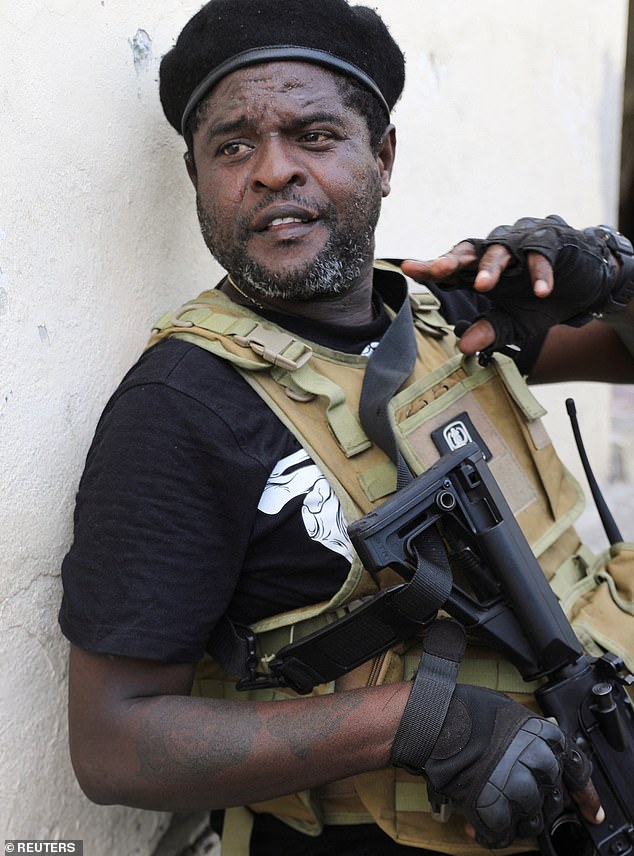
Gang leader Jimmy ‘Barbecue’ Cherizier has vowed to take control of the Caribbean island
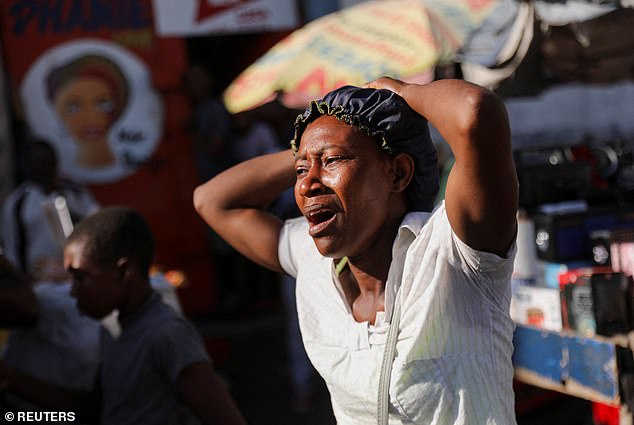
A woman in the capital cries as the bodies of people she knew are taken from the streets
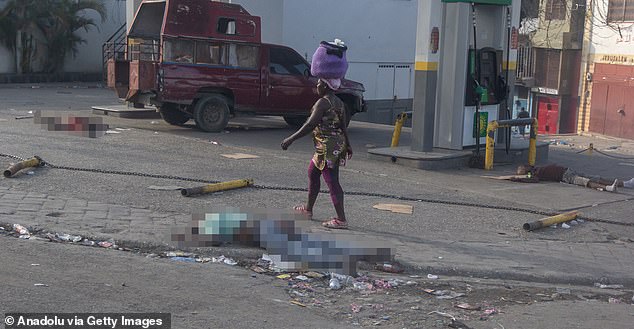
No area in the capital is free from horror as gangs battle with police and each other for control
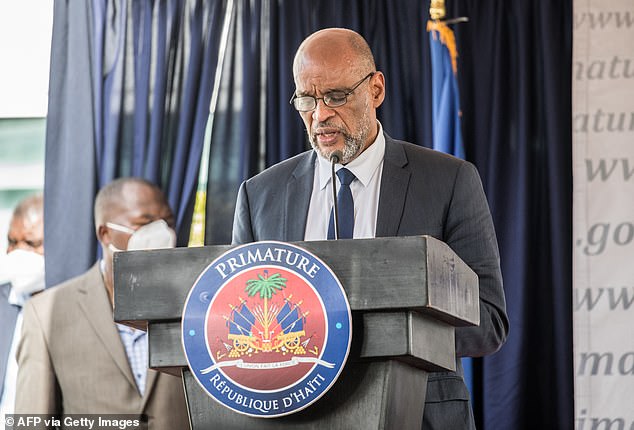
Ariel Henry, 74, submitted his resignation on March 11, a week after the growing coalition of gangs warned of civil war if he does not resign
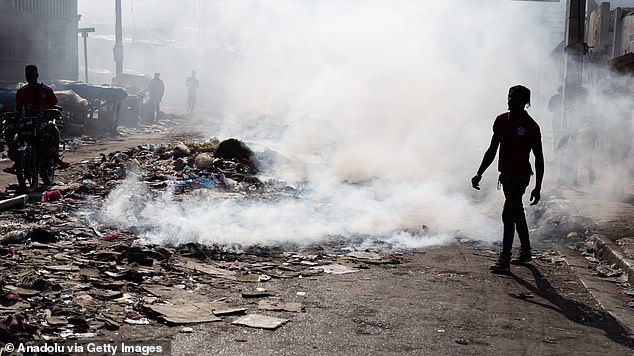
Bodies lay in the rubbish as residents attempted a haphazard cremation on the streets
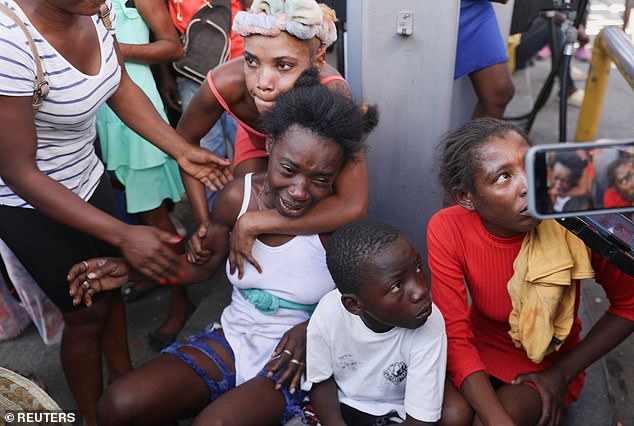
Thousands of people have been killed in the violence and almost 1.5 million people are at risk of famine
The movement took off last year when residents of relatively affluent neighborhoods managed to drive the Ti Makak gang from their streets.
“This is the way the gangs operate: they take over areas with big companies and force them to pay for them while they maintain control,” a vigilante told CNN on Monday.
‘We receive threats all the time; they say they will come and attack us and destroy the neighborhood.
“So we block the streets and the police from conducting searches; no civilians are involved in car searches.
He said the vigilantes are armed only with “machetes and our bare hands,” but the UN blames them for killing hundreds of “gang members,” often burning their bodies in the streets.
“The bandits send the spy on a motorcycle to come and see if there is a barricade in the way and how many people are manning it,” the vigilante said.
“But if anyone comes looking suspicious, they’ll question him, find out who he is, check his phone. If he has messages with bandits, they should take him away.
“Then they burn them.
“It’s not a war, the neighborhood is trying to protect itself.”
The city’s port and airport are closed, and in parts of the city’s east side, “malnutrition rates are comparable to those in any war zone in the world,” said Jean-Martin Bauer of the U.N. World Food Program.
He noted that Croix-des-Bouquets, in the eastern part of Haiti’s capital, “has malnutrition rates comparable to those in any war zone in the world.”
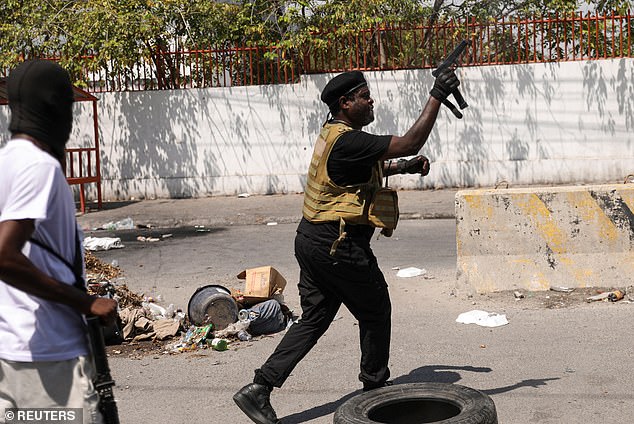
The leader of the alliance of gangs, former police officer Jimmy ‘Barbecue’ Cherizier, is said to have gotten his nickname after burning his enemies
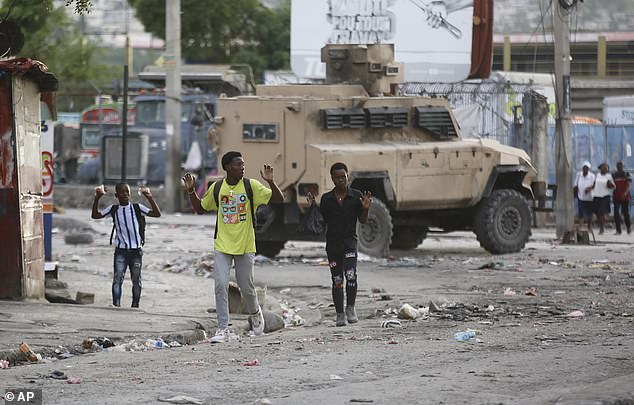
The violence escalated on March 11 and left police struggling to gain control
Some hospitals in Port-au-Prince have been forced to close due to safety concerns, and according to UNICEF, only two surgical operating facilities are operational.
And shortages of electricity, fuel and medical supplies have hit hospitals across the country, with six out of 10 facilities unable to function.
‘It looks like a scene from Mad Max. Frankly, it seems that way,” said Catherine Russell, UNICEF executive director.
“Gangs, vigilantes responding to the gangs.
“Now they’ve basically taken over the capital, they’ve taken over the airport. What that means for people is that we can’t get help anymore, it’s very difficult for us to do that,” Russell said.
“I mean, it’s literally one thing after another for Haiti, and I think right now this is the worst that anyone has seen in decades.”
A charter flight carrying dozens of U.S. citizens fleeing the country landed in Miami on Sunday after the U.S. embassy urged citizens to leave “as soon as possible.”
Passenger Avlot Quessa, who lives in Boston, traveled from the center of the country to board the charter flight after heading to Haiti last month for a weeklong trip to visit his mother.
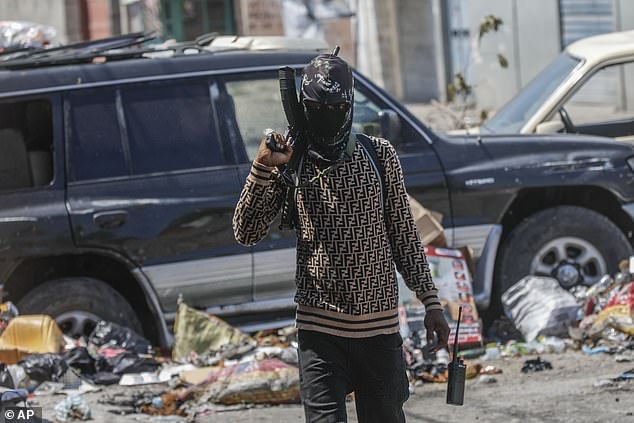
Armed militias roam the lawless streets of the capital with impunity
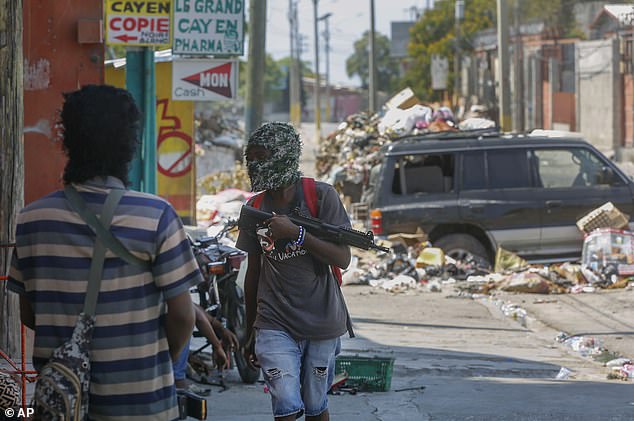
Basic services are a distant memory in a country already struggling to recover from two devastating earthquakes in 2011 and 2020
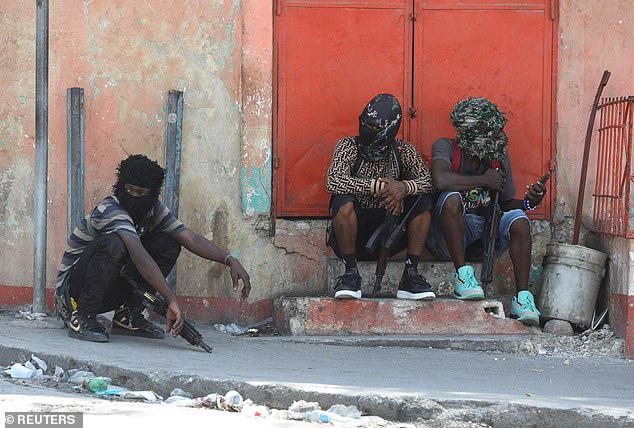
The situation has forced thousands of people to flee their homes, while locals continue to report the overwhelming stench of the dead. Meanwhile, politicians across the region are looking for a solution – one that may now be in sight following Henry’s removal
‘It’s just terrible. You can only imagine the suffering,” Quessa told The Miami Herald of the nearby Caribbean country.
“Haiti is my homeland and it is very stressful to see the homeland going through this act of violence and destruction, and they are our neighbors.
The State Department announced Saturday that it would offer limited charter flights for U.S. citizens from the less chaotic northern city of Cap-Haïtien.
Officials said they could not provide ground transportation to Cap-Haïtien and that U.S. citizens should consider the charter flights only “if you believe you can reach Cap-Haïtien airport safely.”
“We encourage U.S. citizens still in Haiti who wish to leave to contact the Department of State using the crisis intake form on our website, if they have not already done so,” the agency said.
“They’re just miles away from Miami,” Quessa said, “we can’t keep our eyes on Haiti anymore.”
